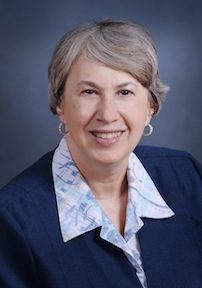Dean Gutierrez Elected President of Council of Colleges of Arts and Sciences

Nancy A. Gutierrez, Dean of UNC Charlotte’s College of Liberal Arts & Sciences, has been elected President of the Council of Colleges of Arts and Sciences (CCAS), the nation’s most influential association for academic leaders in the liberal arts and sciences.
Gutierrez will take office in November 2013. CCAS represents more than 500 member institutions and 1,600 deans, associate deans and assistant deans.
“Dean Gutierrez is a national leader in the advancement of knowledge in the traditional areas of liberal arts and sciences,” said Dr. Joan F. Lorden, Provost and Vice Chancellor for Academic Affairs for UNC Charlotte. “She is vigilant in reminding us of the centrality of the liberal arts and sciences to our mission as the state’s urban research university and has helped us interpret traditional disciplines in a contemporary context, promoting the connections across disciplines and championing emerging disciplines.
“With its broad array of graduate and undergraduate programs, the College of Liberal Arts & Sciences is essential to the university’s ability to fulfill our educational, scholarly, and community engagement commitments.”
Gutierrez said her election to the national post provides an opportunity to advocate nationally on behalf of the mission of liberal arts and sciences education.
“It will be an honor to serve this organization,” she said. “CCAS plays a unique role in American higher education, encouraging both intellectual leadership and practical collaboration. It’s an organization where deans step up to help other deans find the best ways to promote our missions of promoting foundational learning and furthering our institutions’ commitments to basic research.”
The mission in the liberal arts and sciences is to lead in the discovery, dissemination, and application of knowledge, Gutierrez said.
“Faculty in these colleges contribute significantly to the stores of new knowledge that are critical to the advancement of humanity while at the same time they also develop creative, pragmatic solutions to the world’s problems,” she said.
“In our role as educators, we train undergraduate and graduate students who engage with local, national, and global communities in transformative ways. Liberal arts and sciences colleges are places of scholarly inquiry, but also learning laboratories where students develop the thinking skills necessary to meet future challenges. They leave with the critical tools they need to succeed, no matter where they choose to live and work, and they develop the habits of mind and character to make the world a better place.
UNC Charlotte’s College of Liberal Arts & Sciences offers 8 Ph.D. programs and over 35 master’s programs and graduate certificates, and nearly 30 undergraduate degrees in the humanities, social and behavioral sciences, natural sciences, and mathematics. In 2011-12, the college served over 7,100 undergraduate majors and over 850 graduate students. It had over 450 full-time faculty and was responsible for over $7.5 million in sponsored research dollars in 2012, representing just over one-quarter of the university’s total external research funding, the most of any of UNC Charlotte’s colleges.
Gutierrez joined the University of North Carolina at Charlotte as dean of the College of Liberal Arts and Sciences in July 2005. She received a BA in English from Denison University, and a Master’s and Ph.D. in English Literature from the University of Chicago. Prior to coming to UNC Charlotte, she served as Vice Provost for Academic Affairs at Arizona State University, where she was a Professor of English.
Gutierrez has served on several local boards in the Charlotte area, including the Arts & Sciences Council Board of Directors. She has been a member of the national Council of Colleges of Arts and Sciences Board of Directors since 2009.
A scholar of early modern English literature, she has published on Shakespearean drama and early modern women. Her most recent book is “Shall She Famish Then”: Female Food Refusal in Early Modern England (Ashgate). She has also published on issues in higher education, particularly on the intersection of a liberal arts education and academic administration.
CCAS is a national association of colleges and universities. Its purpose is to nurture and sustain the arts and sciences as the leading influence in American higher education. CCAS is the forum for the exchange of ideas and information among deans of arts and sciences and represents the liberal arts at a national policy-making level.